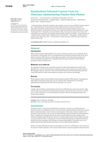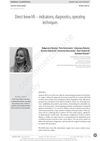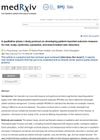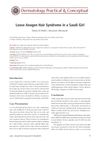Polyglutamic acid is a valuable, sustainable ingredient for skincare and haircare products.

A standardized consent form for PRP injections improves patient trust and legal protection.
 April 2024 in “Clinical, cosmetic and investigational dermatology”
April 2024 in “Clinical, cosmetic and investigational dermatology” Saudi dermatologists' understanding and use of low-dose oral Minoxidil for hair loss may not be fully represented due to a small survey sample and language barriers.
 March 2024 in “Daehan budongsan hakoeji/Daehan bu'dongsan haghoeji”
March 2024 in “Daehan budongsan hakoeji/Daehan bu'dongsan haghoeji” Different factors like age, size, and location of subway stations affect sales of hair salons, coffee shops, and convenience stores in Seoul differently.
 February 2024 in “Oriental Journal of Chemistry/Oriental journal of chemistry”
February 2024 in “Oriental Journal of Chemistry/Oriental journal of chemistry” Eclipta alba shows promise for treating various health issues and needs more research.
 January 2024 in “International wound journal”
January 2024 in “International wound journal” The analysis shows growing research on stem cells for wound healing, with the US and China leading, and suggests focusing on how stem cells help in wound healing.
 January 2024 in “Authorea (Authorea)”
January 2024 in “Authorea (Authorea)” Nanomaterials can significantly improve wound healing and future treatments may include smart, real-time monitoring.
 December 2023 in “Ophtha Therapy”
December 2023 in “Ophtha Therapy” Eyebrow lifts are effective for facial rejuvenation but may leave visible scars.
 December 2023 in “Advances in economics, management and political sciences”
December 2023 in “Advances in economics, management and political sciences” Consumers prefer general hair care products over those specifically for hair loss.
 December 2023 in “Data in Brief”
December 2023 in “Data in Brief” Curly hair's strength and flexibility vary with moisture and temperature.
 November 2023 in “BMC genomics”
November 2023 in “BMC genomics” The study concluded that the arachidonic acid pathway and the protein KRT79 play a role in determining the fineness of cashmere.
 October 2023 in “Microorganisms”
October 2023 in “Microorganisms” Nirmatrelvir/Ritonavir treatment may lead to a weaker immune response to COVID-19, but doesn't affect the chance of rebound.
 September 2023 in “JPRAS Open”
September 2023 in “JPRAS Open” Botulinum Toxin A may help with hair growth and has some side effects; more research is needed.
 September 2023 in “Brazilian Journal of Health Review”
September 2023 in “Brazilian Journal of Health Review” COVID-19 may cause a common type of hair loss called telogen effluvium.

The reviewers found the manuscript on inflammation's role in cancer stem cells to be relevant but suggested it needs clarity, more background information, discussion on immune cells' role in tumors, updated references, and grammar corrections.
May 2023 in “Clinical and translational neuroscience” Tailored neurorehabilitation programs improve life quality for post-COVID-19 patients.

Baricitinib is a new, effective treatment for advanced alopecia areata but is costly and has risks.
 January 2023 in “Biomaterials Science”
January 2023 in “Biomaterials Science” Certain genes are more active during wound healing in axolotl and Acomys, which could help develop materials that improve human wound healing and regeneration.
 January 2023 in “International journal of homoeopathic sciences”
January 2023 in “International journal of homoeopathic sciences” Homeopathy helped a 30-year-old man regrow his hair.
January 2023 in “Psychology” Emotional Freedom Techniques (EFT) treatment improved seed germination and growth, suggesting mood affects seed viability.
January 2023 in “Figshare” Ashwagandha Hair Serum may help reduce hair fall.
January 2023 in “Figshare” Ashwagandha Hair Serum may help reduce hair loss.
November 2022 in “Journal of Investigative Dermatology” EGFR is crucial for preventing hair follicle inflammation and hair loss.

The document concludes that the new model realistically simulates male baldness and could be useful for medical purposes and entertainment.
 October 2022 in “JAAD international”
October 2022 in “JAAD international” Most patients with autoimmune blistering diseases experienced some hair loss, which may be underreported and linked to disease severity.
 August 2022 in “medRxiv (Cold Spring Harbor Laboratory)”
August 2022 in “medRxiv (Cold Spring Harbor Laboratory)” The goal is to create a tool for patients to report their experiences with various hair and scalp disorders.
 June 2022 in “Research Square (Research Square)”
June 2022 in “Research Square (Research Square)” The conclusion is that metformin may be useful for treating various conditions beyond diabetes and that time-tracking analysis is a good way to review drug research.
 March 2022 in “Women's health issues”
March 2022 in “Women's health issues” The conclusion is that women are heavily affected by autoimmune skin diseases, face significant challenges, and need better research, treatments, and healthcare policies.
 January 2022 in “Clinical Cases in Dermatology”
January 2022 in “Clinical Cases in Dermatology” Some hair loss from medication may reverse after stopping the drug, but treatment options are limited and ongoing research is needed.
 October 2021 in “Dermatology practical & conceptual”
October 2021 in “Dermatology practical & conceptual” A Saudi girl was diagnosed with Loose Anagen Hair Syndrome, a rare condition causing easy hair loss without scarring.























